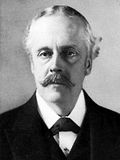 |
Arthur James Balfourb. 25 Jul 1848, Whittingehame, East Lothian, Scotland |
| 29 Jun 1895, sworn in as First Lord of the Treasury before the Queen in Council, Windsor; issuing of Letters Patent under the Great Seal for appointment as Lord Commissioner of the Treasury is announced by the Crown Office 6 Jul 1895 and gazetted 9 Jul 1895 [The London Gazette. No. 26639. Tuesday, July 2, 1895, p. 3719; The London Gazette. No. 26642. Tuesday, July 9, 1895, p. 3877.] | |
| Ministerial offices: | President of the Local Government Board (24 Jun 1885 - Feb 1886) |
| Secretary for Scotland (5 Aug 1886 - Mar 1887) | |
| Chief Secretary for Ireland (7 Mar 1887 - 9 Nov 1891) | |
| First Lord Commissioner of the Treasury and Leader of the House of Commons (Oct 1891 - Aug 1892, 29 Jun 1895 - 4 Dec 1905) | |
| Lord Privy Seal (12 Jul 1902 - 11 Oct 1903) | |
| First Lord of the Admiralty (25 May 1915 - 10 Dec 1916) | |
| Foreign Secretary (10 Dec 1916 - 23 Oct 1919) | |
| Lord President of the Council (23 Oct 1919 - 24 Oct 1922, 27 Apr 1925 - 7 Jun 1929) | |
| Names/titles: | Sir Arthur James Balfour [from 3 Mar 1922, Knight of the Garter]; 1st Earl of Balfour, Viscount Trapain of Whittingehame, East Lothian [from 5 May 1922] |
| Biography: | |
The son of a Scottish landowner, Arthur James Balfour received his degree from Trinity College, Cambridge, in 1869. Elected MP (1874-1906, 1906-1922) in 1874 at the age of 26, Balfour took office in his uncle's (Lord Salisbury's) administration as President of the Local Government Board (1885-1886). From 1887 to 1891 he was Chief Secretary for Ireland. Salisbury then appointed him Leader of the House of Commons (1891-1892, 1895-1905), and Balfour became his spokesman and sounding board in the Commons. He was also given the office of First Lord of the Treasury (1891-1892), usually reserved for prime minister. When Salisbury resigned in 1902 Balfour was entrusted with the formation of government by King Edward VII on 12 Jul 1902. He retained the office of First Lord of the Treasury (1895-1905) and also assumed the post of Leader of the Conservative Party (12 Jul 1902- 8 Nov 1911). Balfour believed in maintaining the Empire and was shocked by government inefficiencies revealed in the conduct of the Boer War. He threw his considerable energies behind the problems of national defense, establishing an effective Defense Committee of the Cabinet (with himself in the chair) and supported the development of the navy. Although he opposed Home Rule for Ireland, he was instrumental in the Irish Land Purchase Act (14 Aug 1903) designed to help tenants purchase land. Active in foreign affairs he negotiated skillfully during the Russo-Japanese war (1904-1905) and took a positive stance concerning emerging Anglo-American cooperation. In domestic matters he was particularly concerned with education, and he promoted the Education Act (18 Dec 1902), which provided state aid for voluntary schools. During his administration a number of new universities were founded, including Manchester, Liverpool, and Sheffield, and he always supported the role of modern technology in developing industry and hence exports and trade. In December 1905, he failed to secure party unity on fiscal matters and resigned (4 Dec 1905) after three years in office. During the next twenty years Balfour held many senior posts, including Foreign Secretary (1916-1919), when he made the celebrated Balfour Declaration in 1917 to 'establish in Palestine a national home for the Jews'. As Lord President in 1921 he represented Britain at the Washington Conference on Naval Limitation and joined the Cabinet of Stanley Baldwin as late as 1925, adding to an unusual record of sustained post Prime Ministerial service. [1, pp. 217-222] |
|
| | |
| [1] | Englefield, Dermot; Seaton, Janet; White, Isobel (eds.) Facts About the British Prime Ministers: A Compilation of Biographical and Historical Information. New York: The H.W. Wilson Company, 1995. online |
| Image: photograph of Arthur James Balfour, c. 1900 (Bassano and Vandyk). | |
